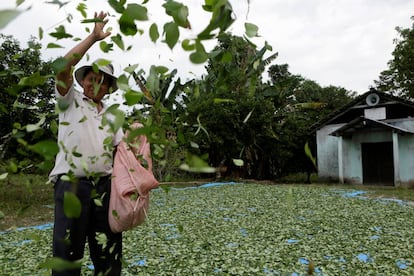Bolivia doubles amount of land authorized to grow coca plant
Controversial law aims to provide guideline for efforts to eradicate “surplus capacity” coca
Bolivia has just passed a controversial law nearly doubling the amount of land allocated to producing coca, authorizing production of some 22,000 hectares between two powerful rival farmers’ groups, one of them led by President Evo Morales.

As things stand, some 25,000 hectares of land are already being used to grow coca. The 22,000 hectares where coca production will now be authorized is significantly larger than that established by an international study for the legal consumption of the plant. The significance of the new limit is that it will provide a guideline for state efforts to eradicate so-called surplus capacity coca.
Coca leaves are chewed in Bolivia and other South American countries as a mild stimulant, with similar effects to caffeine. The practice is protected by the state, but establishing the amount of land to be used for growing has been disputed for decades.
There has been anger that the move will encourage drug trafficking
The neo-liberal governments of the 1990s set about destroying coca cultivation in Bolivia’s central Chapare region, which met with fierce resistance from local farmers, who earned more from it than other crops. Morales came to prominence during the at-times violent “coca defense,” and retains his status as a “historic leader” of the coca growers of Chapare. The opposition accuses him of protecting vested interests and not acting in the interests of the country.
In 2004, Morales’ predecessor, Carlos Mesa, ended the zero-tolerance policies of the 1990s toward coca production, and approved legislation authorizing families in Chapare to grow coca in limited amounts. This added some 3,000 hectares to the 12,000 already authorized in Yungas de La Paz, the country’s traditional coca-growing area. In reality, he had authorized a further 10,000 hectares.
Morales, who took office in 2006, prepared a bill to give Chapare its own quota of authorized coca production. This angered coca growers in Yungas, who until then enjoyed a monopoly on legal coca production. These growers were not led by Morales.
Coca production is protected by the Bolivian state
After a week of violent clashes with police in La Paz, the Yungas growers and Morales reached agreement. The former would accept the new law, receiving in return more hectares where it was authorized to grow coca. The agreement required Morales to improve his offer to the Chapare growers, who are locked in a bitter rivalry with their northern competitors. To square the circle, the government has had to increase the total amount of land where coca growing is authorized from the 20,000 initially proposed to 22,000, with 14,300 for the Yungas and 7,700 for Chapare.
There has been widespread anger at the law in the Bolivian press and on the social networks based on fears that it will only encourage drug trafficking. The government argues in turn that the new law simply regularizes an already-existing reality.
English version by Nick Lyne.
Tu suscripción se está usando en otro dispositivo
¿Quieres añadir otro usuario a tu suscripción?
Si continúas leyendo en este dispositivo, no se podrá leer en el otro.
FlechaTu suscripción se está usando en otro dispositivo y solo puedes acceder a EL PAÍS desde un dispositivo a la vez.
Si quieres compartir tu cuenta, cambia tu suscripción a la modalidad Premium, así podrás añadir otro usuario. Cada uno accederá con su propia cuenta de email, lo que os permitirá personalizar vuestra experiencia en EL PAÍS.
¿Tienes una suscripción de empresa? Accede aquí para contratar más cuentas.
En el caso de no saber quién está usando tu cuenta, te recomendamos cambiar tu contraseña aquí.
Si decides continuar compartiendo tu cuenta, este mensaje se mostrará en tu dispositivo y en el de la otra persona que está usando tu cuenta de forma indefinida, afectando a tu experiencia de lectura. Puedes consultar aquí los términos y condiciones de la suscripción digital.








































